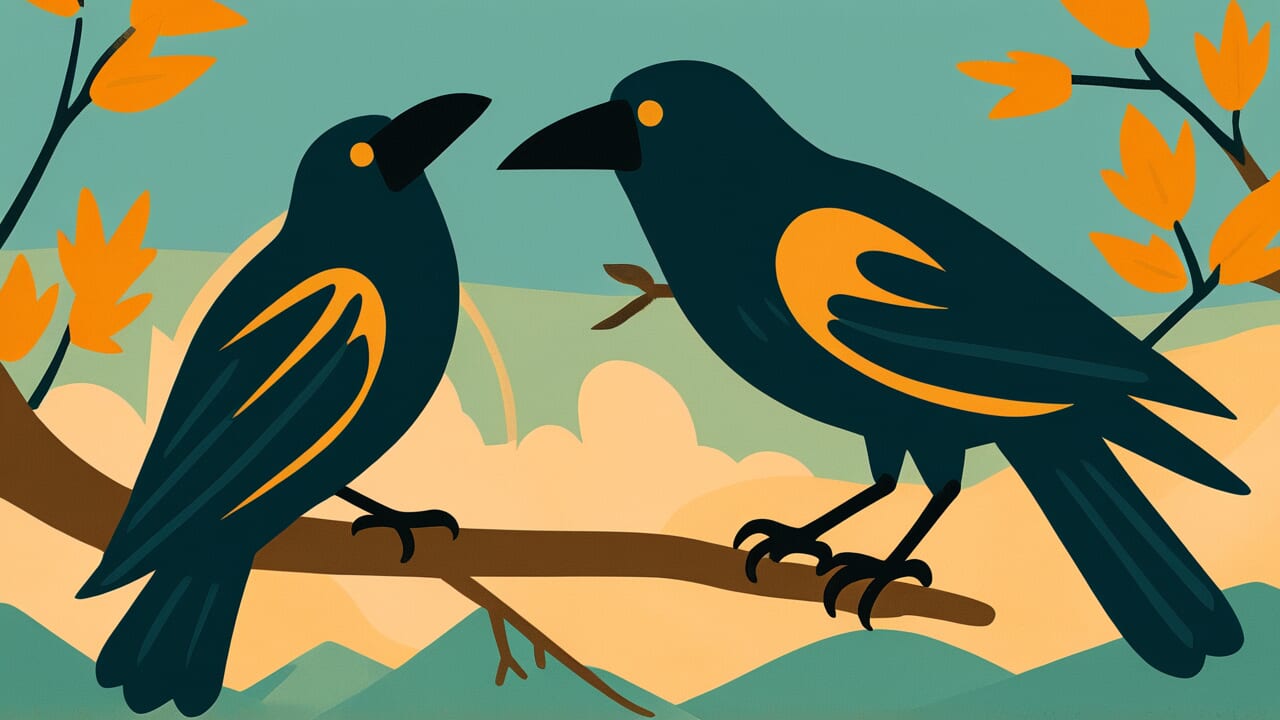How to Read “Like things are crows”
Nita mono wa karasu
Meaning of “Like things are crows”
“Like things are crows” is a proverb that describes things so similar they’re hard to tell apart. It refers to situations where appearance or nature is so alike that distinguishing between them becomes difficult.
This proverb is used when comparing two or more things. For example, twin siblings, products with identical designs, or people with similar personalities.
It applies when the subjects share so many common features that identification becomes challenging.
By using the specific bird “crow” as an example, the proverb transforms the abstract concept of “being similar” into a familiar image everyone can understand.
Crows have black feathers and are known as birds whose individual differences are hard to notice from a distance. This visual characteristic perfectly expresses the difficulty of distinction.
Even today, this proverb works as an effective expression when explaining situations where appearance or content is almost identical and choosing becomes difficult.
It also describes circumstances where differences in individuality are hard to see.
Origin and Etymology
No clear written records remain about the origin of this proverb. However, we can make interesting observations from how the phrase is constructed.
“Karasu,” or crows, have long been familiar birds in Japan. Crows with jet-black feathers are birds whose individual differences are hard to distinguish from afar.
If you observe each crow carefully, you’ll find differences in beak shape, body size, and calls. But when you see them flying in flocks or perched in rows on power lines, they all look the same.
This characteristic of “being indistinguishable” is thought to be the core of the proverb. From a human perspective, crows probably seemed like creatures that all looked similar, making it difficult to find individuality.
Japanese has many proverbs and idioms using crows, such as “crow’s quick bath” and “crow’s glossy wet-feather color.”
This shows that crows were easy to observe in daily life. There was a culture of overlapping their characteristics with human society’s phenomena.
“Like things are crows” can be considered one expression born from such observational skills. It’s believed to be a phrase naturally nurtured within common people’s lives.
Usage Examples
- These two products are like things are crows, so it won’t make much difference which one you choose
- Their proposals are like things are crows, so we’ll have to decide based on price
Universal Wisdom
The proverb “Like things are crows” reflects the fundamental human desire to “distinguish” and the real-world dilemma of “being unable to distinguish.”
We are beings constantly forced to make choices. Life presents countless situations where we must make judgments about which to choose and what is superior.
However, in reality, there’s often no essential difference between options. Yet people try to find tiny differences, sometimes even creating non-existent distinctions to justify their choices.
This proverb has been passed down through generations because it provides a perspective for calmly observing such human nature.
The phrase “Like things are crows” teaches us the meaninglessness of forcing ourselves to search for differences. It also suggests the futility of continuing to worry when faced with essentially identical things.
Additionally, this proverb poses a question to modern society, which emphasizes individuality and uniqueness. Not everything needs to be unique, and being similar is also a natural state.
When we’re tired of emphasizing differences, this proverb gives us the reassurance that “it’s okay to be similar.” Here lies gentle wisdom that accompanies humanity’s essential struggles.
When AI Hears This
The phenomenon of similar people gathering together can be measured in network science with a value called the “clustering coefficient.”
This is an indicator showing how much your friends are friends with each other. For example, if you have 10 friends and half of them are friends with each other, the clustering coefficient is 0.5.
What’s interesting is that in human relationship networks, this value is very high at 0.3 to 0.5. When people are connected randomly, it only reaches about 0.01.
In other words, humans are clearly designed to cluster with similar people, not by chance.
However, this “birds of a feather” tendency has two sides. Groups with high clustering coefficients spread information quickly and develop strong trust among members.
But at the same time, new information from outside becomes harder to enter. Research shows that when the clustering coefficient exceeds 0.6, the same opinions start circulating within the group.
Even more surprising is the discovery that the most innovative ideas emerge when the clustering coefficient is around 0.3, a state of “moderately similar people gathering.”
When crows cluster completely, they’re safe, but they also need information from crows that are slightly apart. Mathematics teaches us the risks of being too similar.
Lessons for Today
What this proverb teaches modern people is “the courage to stop searching for differences.” We live in an age of information overload.
Whether choosing products or deciding on career paths, countless options line up before us. And we keep comparing tiny differences, trying to choose something even slightly better.
However, realizing that essentially like things are crows frees us from unnecessary worries. If there’s no real difference between choices, it’s fine to decide by intuition.
What matters is making use of your choice afterward, not demanding perfection in the choice itself.
This proverb also offers insights for human relationships. It teaches us the emptiness of comparing ourselves with others and feeling joy or sorrow over slight superiority or inferiority.
In most cases, we are like things. That’s why, instead of forcing differences, we can build richer relationships by acknowledging our common ground.
When you’re troubled by a choice, remember these words. And gain the power to move forward lightly.



Comments